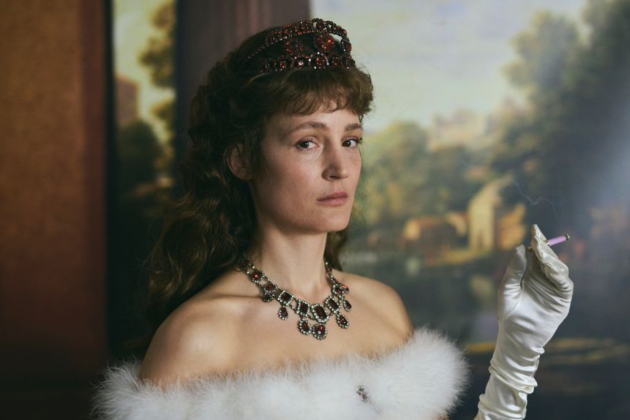Cannes Review: Vicky Krieps In ‘Corsage’
- Oops!Something went wrong.Please try again later.

It took the Empress Elisabeth’s strongest lady’s maid an hour every morning to lace her stays. The Emperor Franz-Joseph’s wife Sissi, as she was fondly known to the subjects of the Austro-Hungarian empire, was famous for the narrowness of her waist, which reputedly measured 19 and a half inches; the slightest weight gain was a matter of seething public interest. It looks very much as if Vicky Krieps, who brings great complexity to her portrait of the empress in Marie Kreutzer’s Un Certain Regard title Corsage, shares the imperial measurements. Let’s hope that is just a trick of the camera. So much corsetry — or corsage, the word we hear much used in the royal dressing-rooms of 19th-century Vienna — doesn’t leave much room for little things like ribs.
Sissi was a Bavarian princess, given a liberal upbringing by her royal but bohemian parents, who married the emperor (Florian Teichtmeister: superbly restrained) when she was 16 and was on the throne for 44 years. Kreutzer’s script focuses on just one of those years: 1878, the year Sissi turned 40 which, as her doctor points out, was the average age of death among her female subjects. Of course, she is more horrified by her age than anyone else.
More from Deadline
Cannes Review: Joel Edgerton & Sean Harris In Thomas M Wright's 'The Stranger'
Algerian Actor Ahmed Benaissa Dies At 78, Hours Before Latest Film Screens At Cannes
Since nobody wants her opinion on matters of state — she infuriates her husband by mentioning tensions in Sarajevo over the breakfast table — she puts her scattered energies into travel, technical novelties like a camera that records moving pictures. Above all, she concentrates on slimming. Sissi never saw a weight-loss plan she didn’t like. She takes cold baths, swings on gymnastic rings in her sitting room, fences like Zorro and survives on a diet consisting mostly of half-rations of beef broth and chocolates. Clearly, she had an eating disorder to beat the band.
Historians of the time described her as extraordinarily selfish, even by the standards of people who can get away with shouting at servants whenever they feel like it. Kreutzer is obviously making a case for Sissi as a woman comprehensively stymied by the combined forces of patriarchy and court protocol, but she is not the kind of filmmaker to avoid unpleasant truths. Her Sissi is a textbook narcissist. Men must desire her and women must admire her; anyone who fails to adore her sufficiently is dropped. Her closest lady-in-waiting Marie (Katharina Lorenz) writes in her diary — as we hear in a rare voiceover — that she is fascinated by her. “She is like a book to me, a riddle on every page.” Hearing that, you rather think Marie’s been had. You wouldn’t want to be Sissi, but you wouldn’t want to have to know her, either. Even on film, she is prickly company.
Cinematographer Judith Kaufman’s visual construction of Corsage is as formal as the world it depicts. Dynamic camera angles — aerial views of dinner plates, a leaping horse shot from underneath its stomach — are like pricks from a governess’ hatpin, reminding us to pay attention. A slow-motion sequence of women ascending a staircase, frequent wide shots showing a landscape that is uncannily symmetrical: these devices are as meticulously considered as the world they help to depict.
All this is set against bizarrely anachronistic music: quite standard now, but the stable boy who starts playing “Help Me Make It through the Night” on the ukulele is still startling. Corsage is a period film that, along with telling a story, inquires into the nature and meaning of period films. It is clever, somewhat didactic, as austere in its intentions as it is lush in execution and as such — dare I say this? — very, very Austrian. Which totally works for me.
The empress was, in fact, assassinated by an Italian anarchist in 1898, 20 years after the film is set. Given the character’s penchant for dangerous sports and constant starvation, not to mention her intermittently weak hold on sanity, it comes as a surprise to learn that she survived two more decades of this life. Corsage gives her a different end, but I suspect Kreutzer is not so much interested in Elisabeth’s biography as she is in drilling through the layers of privilege and frustration, misery and mercurial high spirits, narcissism and idealism to show what happens to women — not just Empress Elisabeth, but any woman — born into a life which offers everything and nothing.
As we watch Elisabeth lead her reluctant, embarrassed daughter around the wards of a mental hospital, holding hands with patients who tell her how pretty she is, we may be reminded of a more recent royal figure. Kreutzer makes no such banal comparisons, however. Her interest lies not with the Queen of Hearts, but with matters of the mind.
Best of Deadline
NFL 2022 Schedule: Primetime TV Games, Thanksgiving Menu, Christmas Tripleheader & More
TV Cancellations Photo Gallery: Shows Ending In 2022 & Beyond
Sign up for Deadline's Newsletter. For the latest news, follow us on Facebook, Twitter, and Instagram.

